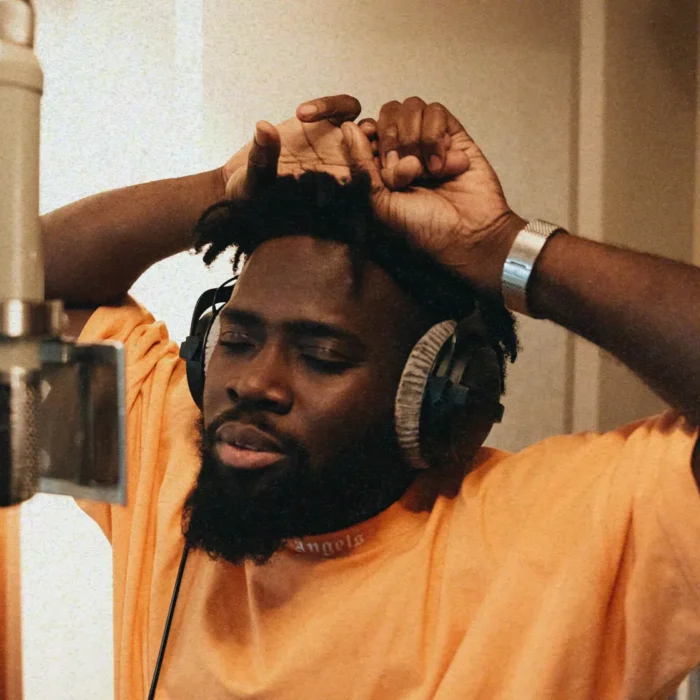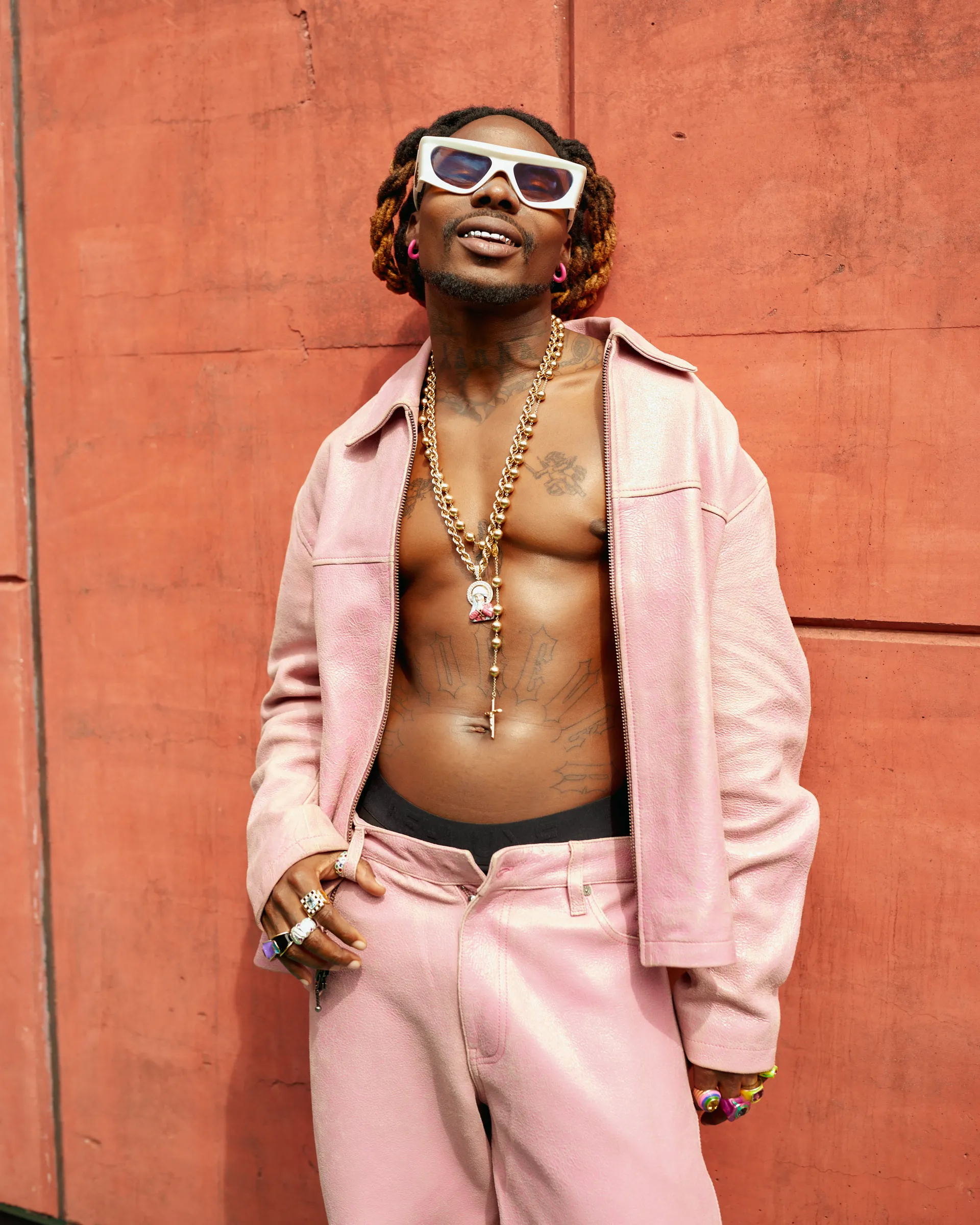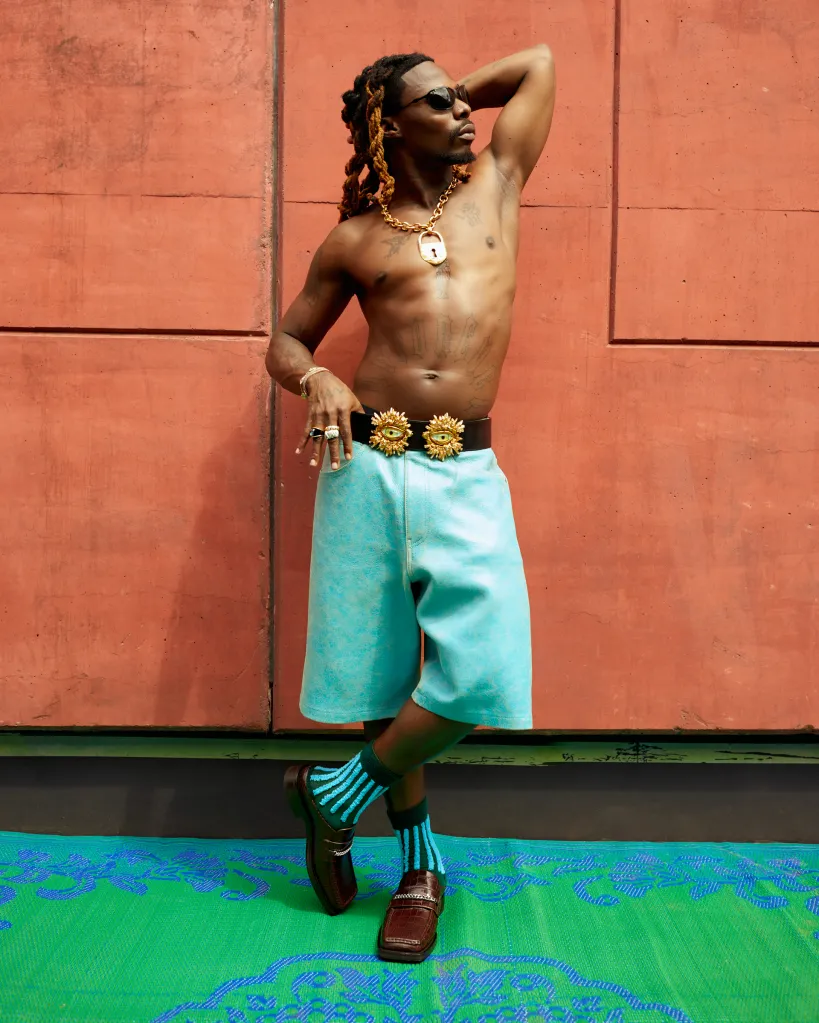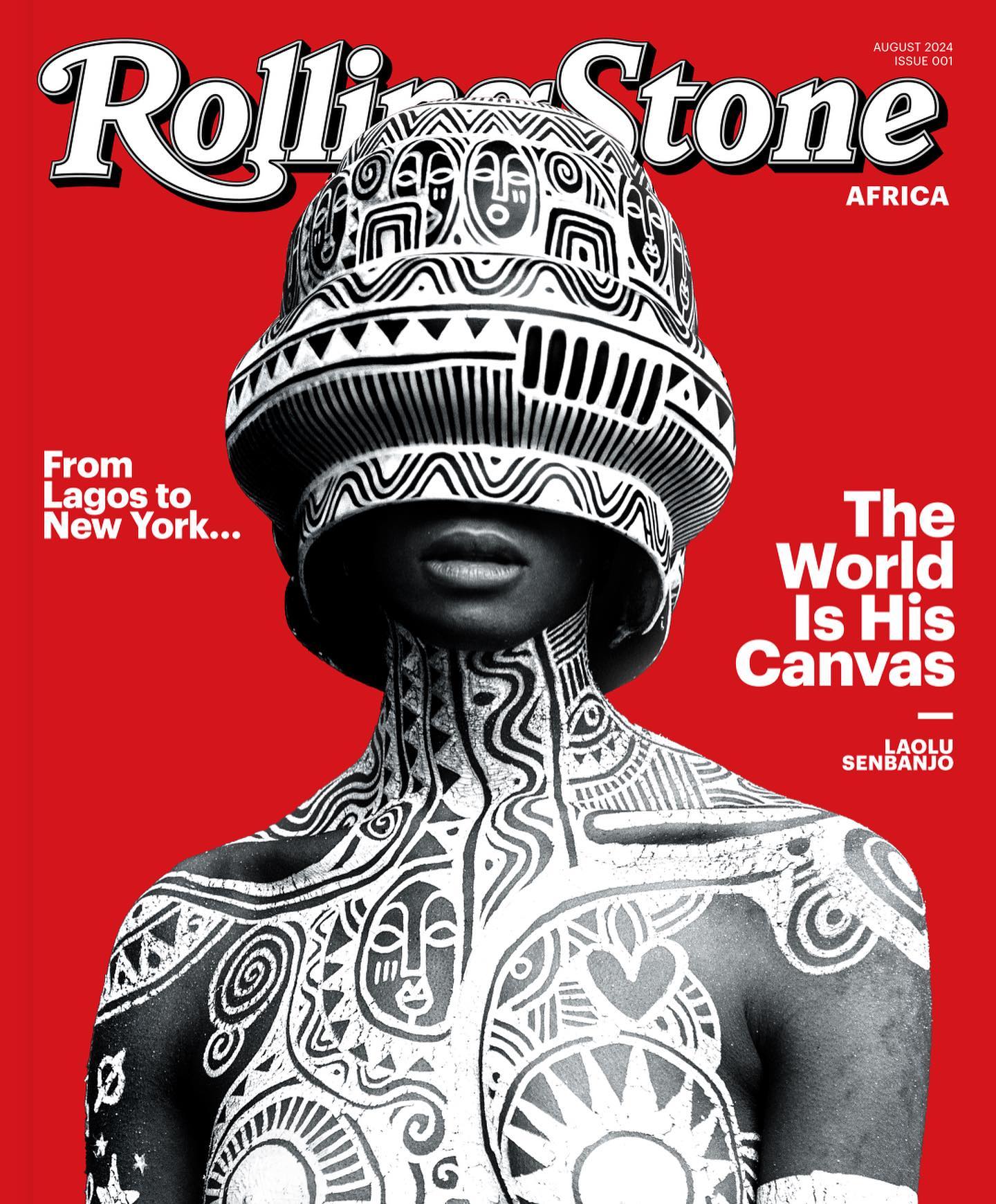


At first, Asake seems taken aback, perhaps unsure of how people standing that high up managed to spot him, but his face lights up after a while, and he waves back. “Make una no fall o,” he jokes: “You people should not fall.”
It’s a Sunday morning in early May, and although the sun isn’t very high yet, the weather is already disagreeably humid. I’m meeting Asake at Nok, a restaurant located behind Alára Lagos, one of the city’s most famous concept stores.
Around this time last year, just as his single “Sungba” was making waves across the globe, Asake found himself consumed by fear and uncertainty. “Last year, I was scared,” he says as we settle into one of the artisanal chairs inside the restaurant. After “Sungba” — a club-ready tune that melds the grittiness of Nigerian street pop with the invigorating groove of South Africa’s amapiano — began to take off, he says, his management told him he needed to drop an album immediately. “I was like, ‘How am I going to do it?’” he says between drags off a blunt.

In person, Asake, 28, has a small frame, but an imposing personality. His large, dark eyes hold a world of expressions; bright with mischief when he begins to crack one of his many jokes, dim and misty when thinking deeply about a question. The way he stares right into people’s eyes when he speaks to them gives the impression that he is not afraid of anyone.
After he graduated in the mid-2010s from Obafemi Awolowo University, where he studied theater arts, Asake moved to Lagos and found himself unmoored for a while. He tried his hand at a number of jobs in the entertainment industry, including making Instagram skits with internet-famous comedian Broda Shaggi. “I was with Shaggi because I didn’t have anywhere to stay after school,” he says.
While he felt in those days that “God is not doing enough for me,” he sees that time now as a necessary step of paying dues. “Those were the days for me to see how the life of entertainment is, without me being somebody,” he says. “Everybody wants to be Number One. Everybody in this life, I can bet it — even the pastor of our church. You just have to go through some stages and learn, so that when the thing you are praying for happens, you know how to say, ‘Ah, yeah, I worked for this shit.’”
Born Ahmed Ololade in a modest household, Asake came onto the Afrobeats scene with a sound that was fresh and difficult to put in context. He was grounded in the storytelling techniques of street-pop artists who came before him, but his sound also borrowed the talking-drum bounce of Fuji music, a genre popular among Nigeria’s Yoruba people. He grew up listening to pioneering Fuji acts like K1 De Ultimate and Ayinde Barrister. The latter artist is his favorite to this day: “I love Barrister a lot, because of the soul in his voice,” he says. “When you talk about music, real music, it is Barrister’s for me.” He also listened to songs from the Cherubim and Seraphim church, known for its bells and conga drums, and the white gowns members wear to church. “I just like spirituality, songs that can wake your spirit,” he says. “I need things to always spark me.”
This combination of influences and sounds, which he perfected on his 2022 debut album, Mr. Money With the Vibe, has made Asake a global star. Although he mostly sings in Yoruba and pidgin, two of Nigeria’s most widely spoken languages, he has fans around the world. “He’s all about good energy, and that’s what matters to people,” says legendary Nigerian rapper Olamide, under whose label Asake is signed in Nigeria. “No matter what language you speak, you can feel the emotion in his music.”

Even Asake is still processing what it’s like to be that guy. “I thank God,” he tells me. “Even me, I did not know that I would be that guy. I was dreaming, the way Nigerians dream that they will be a superstar one day.”
On its release last September, Mr. Money With the Vibe won rave reviews and recorded the biggest opening weekend for an African album in Apple Music’s history; Asake ended up with 1.24 billion global on-demand streams in 2022, according to Luminate data. He began numerous sold-out world tours, where venues frequently overflowed with fans. The situation felt like it could spin out of control, and in December, it did: Two people, Rebecca Ikumelo and Gaby Hutchinson, died and seven more were injured after a crowd crush at one of his shows in South London. Asake declines to discuss the incident with me in detail, but at the time, he issued a statement expressing his devastation.

His experience on tour, including the tragic South London incident, led him to make a song called “Yoga” when he returned home. It’s a thoughtful, slow-paced number, lined with chants and drums, in contrast to his usual style. “What really inspired the song was the whole London thing that happened,” he says. “Everything was just so overwhelming. After having 5,000 people inside my show, I still had over 4,000 people outside trying to enter.” “Yoga” was Asake’s attempt at finding some inner peace. The song shot straight to Number One in Nigeria.
In less than a year, Asake’s life has seen a sharp change in course. Some of what that has meant for him is made clear on his second album, Work of Art, which he made while on the road and finally released this June. “The inspiration is not different,” he says. “It just got deeper and made me more conscious that all eyes are on me.”
Asake spends much of the album working through feelings of shock at how different his life is now, and gradually arriving at acceptance. It’s notably a project that favors deliberate storytelling over the hooks he’s best known for. “I want my listeners to see the artistic side of me,” he says. “I want my listeners to feel the soul in my vocals and how I express myself. I take my time to create these songs because I want to create a lasting experience.”
To maintain his spiritual grounding, Asake prays each morning, and he listens to his favorite gospel songs. “I learned these at the start of my life,” he says. “So I can’t forget [them].” The bottom line for him, he adds: “I am still the same guy, with the same dream, but just on a different level.”
Those around Asake say they’re doing what they can to keep him grounded in the life he had before fame came around. “Asake has got heart,” his manager, Stephen Nana, tells me. “I know the weight he pulls. He should be walking on air — like, people shouldn’t be able to access him and all that. But Asake’s not that kind of guy. He still wants to eat the roadside food he used to eat back in the day. It’s just that he can’t go there to get it himself.”
After speaking for a while, Asake leaves to go into the Alára store. Following him are a security guard, a few friends, his manager, and the personal stylist who began working with Asake earlier this year.
Asake’s fashion sense is an ever-evolving thing. Gucci, Rick Owens, and Balenciaga are some of his favorite brands; his most notable look was a baggy Balenciaga pants top that helped make him a rising fashion icon in Nigeria when he wore it last fall.
Asake is fully aware of the outsize influence he has now. Looking back, he wishes he’d taken his first U.S. tour, last fall, more seriously. “I would have been more professional, more organized,” he says. “Back then I just went onstage myself. I had a bar onstage. I smoked onstage. I was having fun. Now I understand that you have to plan.”

Senators Press Pentagon for Answers on Rash of Overdose Deaths

BTS’ Label Says They’ve Filed a Criminal Complaint Against Internet Troll Spreading ‘Ill-Intentioned Rumor’

Conservatives Are Melting Down Because Lizzo Played James Madison’s Crystal Flute

How to Help Hurricane Ian Victims in Florida, Puerto Rico, Cuba, and Dominican Republic
When he headlines London’s O2 arena this August, that’s exactly what he’ll be doing. “I want [fans] to come and see a dream come true,” he says. “I will give everything I have, and I will just do my best. I will make everybody proud.”
Before we part ways, I ask Asake what he imagines the future holds. “Only God knows the future, my brother,” he says. “But the future is bright. There is light in the future.”



© Copyright Rolling Stone Africa 2024. Rolling Stone Africa is published by Mwankom Group Ltd under license from Rolling Stone, LLC, a subsidiary of Penske Media Corporation.
By providing your information, you agree to our Terms of Use and our Privacy Policy. We use vendors that may also process your information to help provide our services.
By registering for our sites and services, you agree to our Terms of Service (including, as applicable, the mandatory arbitration and class action waiver provisions) and our Privacy Policy.
We use vendors that may also process your information to help provide our services.
This site is protected by reCAPTCHA and the Google Privacy Policy and Terms of Service apply.
By providing your information, you agree to our Terms of Use and our Privacy Policy. We use vendors that may also process your information to help provide our services.